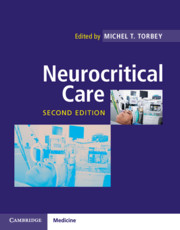Book contents
- Neurocritical Care
- Neurocritical Care
- Copyright page
- Contents
- Contributors
- Preface
- Chapter 1 The Neurological Assessment of the Critically Ill Patient
- Chapter 2 Cerebral Blood Flow Physiology and Metabolism in the Neurocritical Care Unit
- Chapter 3 Cerebral Edema and Intracranial Pressure in the Neurocritical Care Unit
- Chapter 4 Hypothermia in the Neurocritical Care Unit: Physiology and Applications
- Chapter 5 Analgesia, Sedation, and Paralysis in the Neurocritical Care Unit
- Chapter 6 Airway Management and Mechanical Ventilation in the Neurocritical Care Unit
- Chapter 7 Neuropharmacology in the Neurocritical Care Unit
- Chapter 8 Intracranial Monitoring in the Neurocritical Care Unit
- Chapter 9 Electrophysiologic Monitoring in the Neurocritical Care Unit
- Chapter 10 The Role of Transcranial Doppler as a Monitoring Tool in the Neurocritical Care Unit
- Chapter 11 Ischemic Stroke in the Neurocritical Care Unit
- Chapter 12 Intracerebral Hemorrhage in the Neurocritical Care Unit
- Chapter 13 Management of Cerebral Venous Thrombosis in the Neurocritical Care Unit
- Chapter 14 Subarachnoid Hemorrhage in the Neurocritical Care Unit
- Chapter 15 Status Epilepticus in the Neurocritical Care Unit
- Chapter 16 Neuromuscular Disorders in the Neurocritical Care Unit
- Chapter 17 Management of Head Trauma in the Neurocritical Care Unit
- Chapter 18 Management of Autoimmune Encephalitis in the Neurocritical Care Unit
- Chapter 19 Management of Cerebral Salt-Wasting Syndrome and Syndrome of Inappropriate Antidiuresis in the Neurocritical Care Unit
- Chapter 20 Brain Death in the Neurocritical Care Unit
- Chapter 21 Neuroterrorism and Drug Overdose in the Neurocritical Care Unit
- Chapter 22 Infections of the Central Nervous System in the Neurocritical Care Unit
- Chapter 23 Management of the Spinal Cord Injury in the Neurocritical Care Unit
- Chapter 24 Postoperative Management in the Neurocritical Care Unit
- Chapter 25 Ethical Considerations in the Neurocritical Care Unit
- Chapter 26 Pulmonary Consult: Management of Severe Hypoxia in the Neurocritical Care Unit
- Chapter 27 Management of Refractory Arrhythmias in the Neurocritical Care Unit
- Chapter 28 An Infectious Diseases Consult in the Neurocritical Care Unit
- Chapter 29 A Nephrology Consult in the Neurocritical Care Unit
- Chapter 30 Management of Hepatic Encephalopathy in the Neurocritical Care Unit
- Chapter 31 Hypoxic Encephalopathy in the Neurocritical Care Unit
- Chapter 32 Management of Delirium in the Neurocritical Care Unit
- Chapter 33 Generalized Weakness in the Neurocritical Care Unit
- Chapter 34 Management of Severely Brain-Injured Patients Recovering from Coma in the Neurocritical Care Unit
- Chapter 35 Acute Demyelinating Disorders in the Neurocritical Care Unit
- Chapter 36 Building a Case for a Neurocritical Care Unit
- Chapter 37 Neurointensive (NCCU) Care Business Planning
- Index
- References
Chapter 25 - Ethical Considerations in the Neurocritical Care Unit
Published online by Cambridge University Press: 24 July 2019
- Neurocritical Care
- Neurocritical Care
- Copyright page
- Contents
- Contributors
- Preface
- Chapter 1 The Neurological Assessment of the Critically Ill Patient
- Chapter 2 Cerebral Blood Flow Physiology and Metabolism in the Neurocritical Care Unit
- Chapter 3 Cerebral Edema and Intracranial Pressure in the Neurocritical Care Unit
- Chapter 4 Hypothermia in the Neurocritical Care Unit: Physiology and Applications
- Chapter 5 Analgesia, Sedation, and Paralysis in the Neurocritical Care Unit
- Chapter 6 Airway Management and Mechanical Ventilation in the Neurocritical Care Unit
- Chapter 7 Neuropharmacology in the Neurocritical Care Unit
- Chapter 8 Intracranial Monitoring in the Neurocritical Care Unit
- Chapter 9 Electrophysiologic Monitoring in the Neurocritical Care Unit
- Chapter 10 The Role of Transcranial Doppler as a Monitoring Tool in the Neurocritical Care Unit
- Chapter 11 Ischemic Stroke in the Neurocritical Care Unit
- Chapter 12 Intracerebral Hemorrhage in the Neurocritical Care Unit
- Chapter 13 Management of Cerebral Venous Thrombosis in the Neurocritical Care Unit
- Chapter 14 Subarachnoid Hemorrhage in the Neurocritical Care Unit
- Chapter 15 Status Epilepticus in the Neurocritical Care Unit
- Chapter 16 Neuromuscular Disorders in the Neurocritical Care Unit
- Chapter 17 Management of Head Trauma in the Neurocritical Care Unit
- Chapter 18 Management of Autoimmune Encephalitis in the Neurocritical Care Unit
- Chapter 19 Management of Cerebral Salt-Wasting Syndrome and Syndrome of Inappropriate Antidiuresis in the Neurocritical Care Unit
- Chapter 20 Brain Death in the Neurocritical Care Unit
- Chapter 21 Neuroterrorism and Drug Overdose in the Neurocritical Care Unit
- Chapter 22 Infections of the Central Nervous System in the Neurocritical Care Unit
- Chapter 23 Management of the Spinal Cord Injury in the Neurocritical Care Unit
- Chapter 24 Postoperative Management in the Neurocritical Care Unit
- Chapter 25 Ethical Considerations in the Neurocritical Care Unit
- Chapter 26 Pulmonary Consult: Management of Severe Hypoxia in the Neurocritical Care Unit
- Chapter 27 Management of Refractory Arrhythmias in the Neurocritical Care Unit
- Chapter 28 An Infectious Diseases Consult in the Neurocritical Care Unit
- Chapter 29 A Nephrology Consult in the Neurocritical Care Unit
- Chapter 30 Management of Hepatic Encephalopathy in the Neurocritical Care Unit
- Chapter 31 Hypoxic Encephalopathy in the Neurocritical Care Unit
- Chapter 32 Management of Delirium in the Neurocritical Care Unit
- Chapter 33 Generalized Weakness in the Neurocritical Care Unit
- Chapter 34 Management of Severely Brain-Injured Patients Recovering from Coma in the Neurocritical Care Unit
- Chapter 35 Acute Demyelinating Disorders in the Neurocritical Care Unit
- Chapter 36 Building a Case for a Neurocritical Care Unit
- Chapter 37 Neurointensive (NCCU) Care Business Planning
- Index
- References
Summary
Medical ethics deals with moral issues related to the daily practice of medicine [1]. Questions about the behaviors of physicians and healthcare providers, the decision-making process, values, rights, and responsibilities, generate ethical reflection that requires a thorough understanding of philosophical concepts, religion, and jurisdictional laws.
- Type
- Chapter
- Information
- Neurocritical Care , pp. 314 - 323Publisher: Cambridge University PressPrint publication year: 2019



